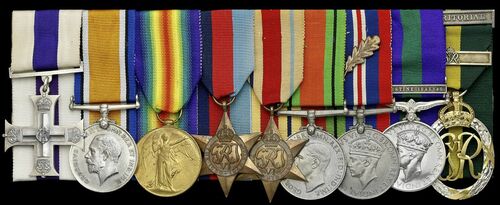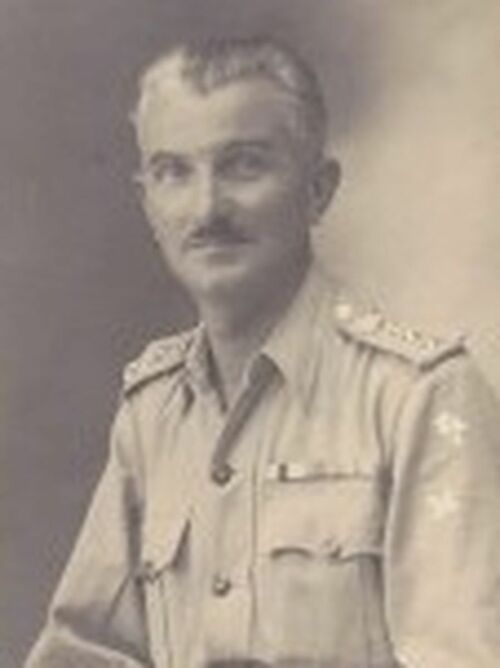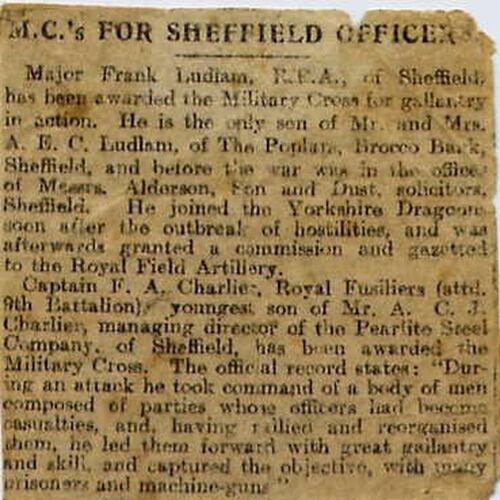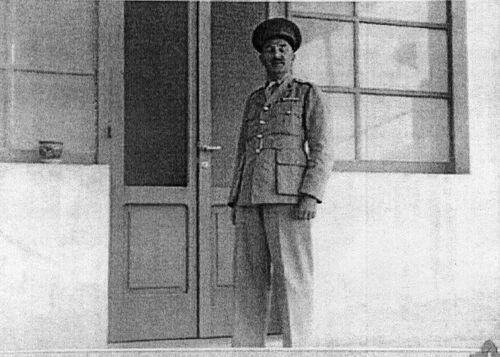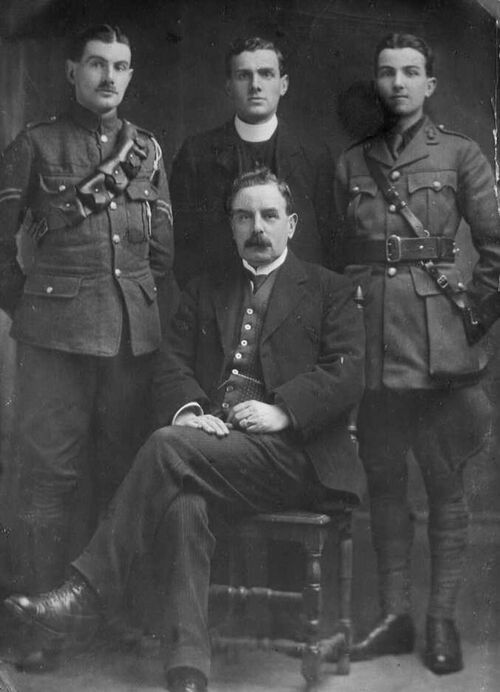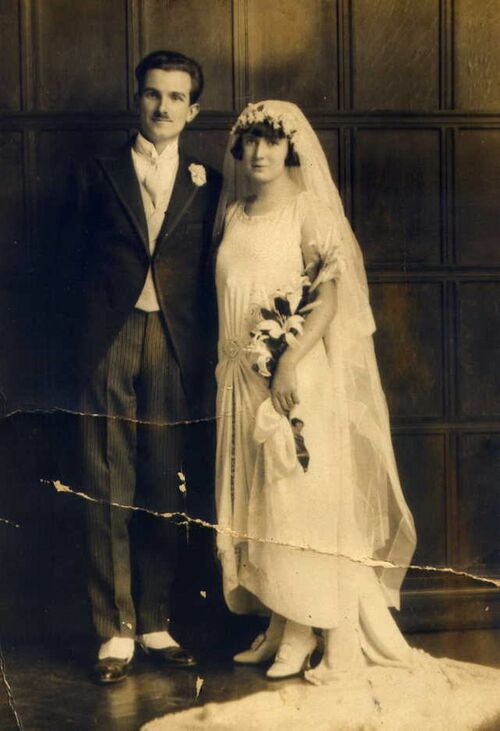Auction: 23002 - Orders, Decorations and Medals
Lot: 112
(x) 'The wood is one mass of dead mutilated bodies. The stench is awful! A German prisoner gives himself up to one of my gun-teams.
At 6:30 on my way across the wood I am caught by the commencement of a heavy bombardment. I take shelter with my servant under a few planks. It becomes too hot, we make a bolt for it, across the Longueval Rd to the trench from Waterlow Farm. I am buried twice + discover myself lying in the open, smothered in dirt. All I had seen was a tremendous red flash + then a crash + as I open my eyes, I find my orderly (a L/C M.G.C.) blown to pieces, a foot here + a leg there etc.
I crawl back to the remains of the trench + eventually find my gun-team & a few odd men. The bombardment continues & then lifts to the supports. Boche open rapid fire + make a frontal attack. My gun team does good work, & attack is held up. I discover a vickers M.G. without any gunners without any gunners. I open fire until a few odd men arrive. We are fiercely bombarded for 12 solid hours no further attack.'
The vivid diary entry of 2nd Lieutenant F. A. Charlier, 23rd (Sportsman's) Battalion, Royal Fusiliers during his baptism of fire during the Somme Offensive
A superb 'Hundred Days' M.C. group of eight awarded to Colonel F. A. Charlier, Royal Pioneer Corps, late 9th Battalion and 23rd (Sportsmans) Battalion, Royal Fusiliers, who later served as commander of a Pioneer Group in Palestine
Military Cross, G.V.R.; British War and Victory Medals (Capt. F. A. Charlier.); 1939-45 Star; Africa Star; Defence and War Medals 1939-45, with M.I.D. oak leaf; General Service 1918-62, 1 clasp, Palestine 1945-48 (Col. F. A. Charlier. M.C. Staff.); Territorial Decoration, with Second Award Bar, the reverse dated '1950', good very fine (8)
M.C. London Gazette 11 January 1919, the original citation states:
‘During an attack he took command of a body of men composed of parties whose officers had become casualties, and, having rallied and reorganised them, he led them forward with great gallantry and skill and captured the objective with many prisoners and machine guns.’
M.I.D. London Gazette 20 December 1941, for services in the Middle East, February to July 1941.
Cross of the Order of St. Mark, the award noted of the website of the Royal Pioneer Corps & Royal Pioneer Association.
Frederick Aloysius Charlier was born at Greenock, Scotland on 2 November 1897, the son of Andrew and Theresa Charlier. The elder Charlier moved regularly for work at the family lived first in Glasgow then Tottenham before finding their way to Sheffield. The younger Charlier however achieved some stability when he was sent to a boarding school, St Ignatius College, Enfield. His father meanwhile went on to become the managing director of the Pearlite Steel Mill, Sheffield.
On the outbreak of war Charlier was commissioned Second Lieutenant on 16 December 1915 with the 23rd (Sportsman's) Battalion) Royal Fusiliers. Completing his training with this unit it was not until 21 May 1916 that he entered the war in France. Remaining with the 23rd Battalion served through the Battle of the Somme, arriving in the trenches for the first time on 5 April 1916. His diary of events talks in frank terms about the terrible conditions with the entry for 7 April stating:
'Wear Gum Boots. Mud up to Hips. Johnson is killed. Leigh wounded in central avenue.'
The regiment faced tough fighting at Delville Wood and later around Montauban and Fricourt between July and August 1916. They arrived in the Redan sector in October and remained here seeing combat at Redan Ridge and Munich Trench. Through months of heavy fighting Charlier proved his courage and leadership ability sufficiently to be promoted Lieutenant on 1 July 1917.
At some stage Charlier transferred to the 9th Battalion, Royal Fusiliers. It was with them he earned his M.C. during an attack to the south of the Bray-Corbie Road. 9th Battalion made good headway through the German positions until faced with a major counter-attack. This forced them back to the frontline trenches were they consolidated their positions. During the fighting Charlier had shown remarkable spirit in rallying the men who had become directionless as a result of heavy losses. A note in the war diary states that the survivors were consolidated into two companies, one of which was under the command of Charlier. Again his abilities were rewarded, this time with promotion to Captain on 15 September 1918.
The end of the war saw Charlier enter the Reserve of Officers as a Captain, a post he still held when mobilised for duty again on 24 August 1939. First posted to the East Lancashire Regiment he was quickly sent to the Pioneer Corps from 1940. Being Promoted Major on 7 October 1940 he was posted to the Sudan early the next year in January 1941. Appointed Officer Commanding No. 2 Depot Pioneer Corps Charlier received his 'mention' for recruiting Sudanese for service in Egypt.
With the end of the war he was posted to Palestine, taking command of a Pioneer Group with the rank of Colonel. Charlier held this post until 17 May 1949 when he retired, retaining the honorary rank of Colonel. He went on to live in a number of places including Oxford and Stoke Mandeville before dying at 3 The Retreat, Princes Risborough, Buckinghamshire on 26 February 1978; sold together with copied research comprising, diary extracts coving July and August 1916, a war diary extract, former listing and London Gazette entries as well as an extract from The Pioneer website and M.I.C.
Subject to 5% tax on Hammer Price in addition to 20% VAT on Buyer’s Premium.
Sold for
£1,600
Starting price
£600

